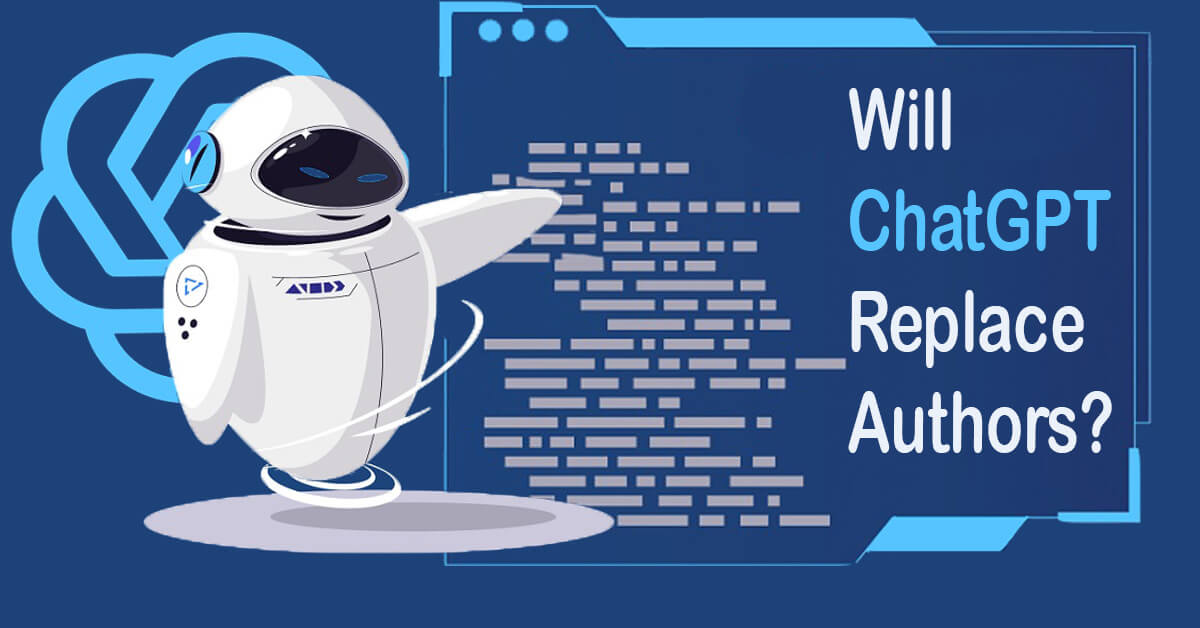
ChatGPT is an awesome writing tool, but do you know its models are trained on the data written/collected by the authors? Well, that makes authors at a superior end.
As an author, the question “Will ChatGPT Replace Authors” got you thinking about the future. With the ability to generate human-like responses to a wide range of prompts, ChatGPT has raised questions about the future of writing and the role of human authors.
This post will address the potential of ChatGPT and state; Will ChatGPT replace Authors?
What Is the Future of ChatGPT in Book Writing?
The continuous evolution of technology will increase the usage of ChatGPT and other AI tools in the writing process. However, it’s unlikely that they will replace human authors entirely. Instead, ChatGPT will enhance and support the creative process, providing writers with new ideas and perspectives.
ChatGPT will keep on generating ideas, characters, and even entire scenes. It will become an increasingly important tool for authors, a great source of inspiration for authors struggling with writer’s block.
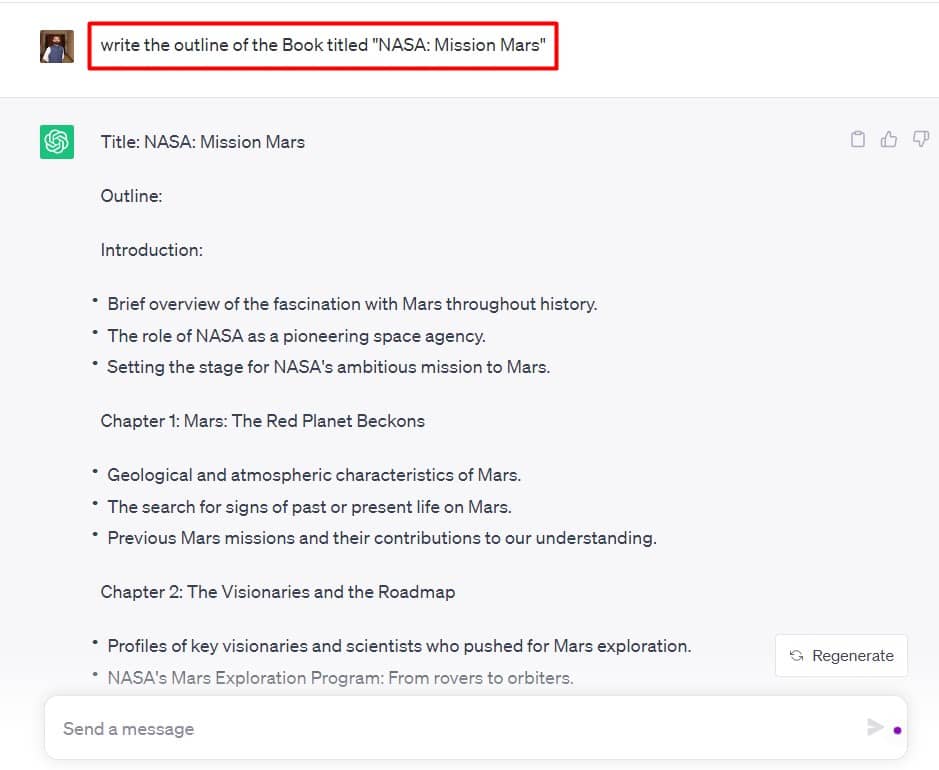
Although ChatGPT has the potential to impact how we write books, it can’t replace the creativity, originality, and emotional depth that characterizes human writing. However, it can analyze an author’s work and provide suggestions for improving the pacing, character development, and dialogue.
Moreover, there is a risk that relying too heavily on ChatGPT could lead to a homogenization of writing styles. If everyone is using the same AI-generated prompts and ideas, there is a risk that all writing will have the same style.
The future of writing is likely to be a collaborative effort between human authors and AI language models like ChatGPT. AI technology will, at best, enhance and support the creative process rather than replace it.
Can ChatGPT Replace Authors?
The short answer is no; ChatGPT cannot replace authors entirely. While it is true that ChatGPT can generate text that reads like it was written by a human, it lacks the creativity and originality of the human author.
AI language models are trained on existing data and can only generate responses based on what they have been exposed to. They cannot come up with original ideas, emotions, or experiences that are unique to human beings. For instance, when asked to generate the content as an Astronaut, the ChatGPT resulted in a generic answer that does not seem to be the experience of an Astronaut.
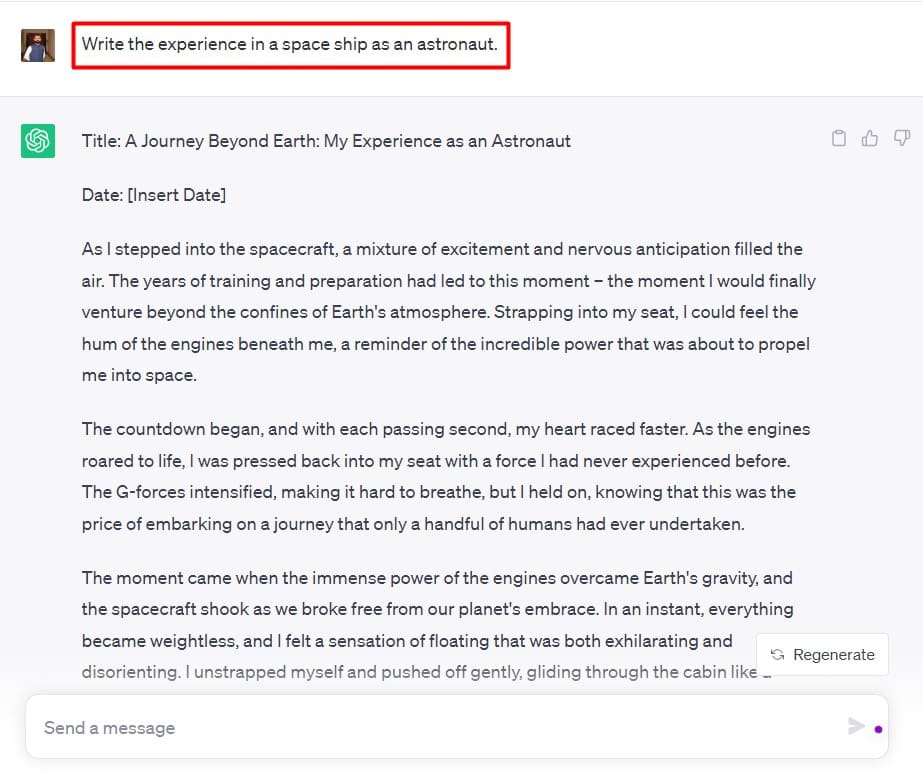
Writing is an art form that requires a deep understanding of human emotions, experiences, and cultural nuances. Authors use their imagination and creativity to express ideas and emotions in ways that resonate with their readers. They can draw on personal experiences, cultural backgrounds, and historical events to create engaging and thought-provoking stories.
While ChatGPT can generate text that reads like it was written by a human, it lacks the creativity and originality that make human authors unique.
5 Facts Why ChatGPT Will Never Replace Authors
ChatGPT has evolved so much that it has impacted the authors. However, it is not the case that it will replace authors. There are some factual limitations of ChatGPT, which will never replace authors. Here are the top reasons why ChatGPT will never fully replace authors.
Writing Is A Deep Personal Process
Writing is a deeply personal process that requires creativity, originality, and emotional depth. Writing is not just about putting words on a page; it’s about telling a story, conveying an idea, or expressing a feeling.
ChatGPT can generate human-like responses but can’t replicate an individual author’s unique voice and style. Authors have their own way of expressing themselves, which makes their work special and sets them apart from the AI content.
Writing Is An Art
Writing is an art that requires a combination of talent, practice, and inspiration to create something truly special. ChatGPT can generate responses based on the training data, but it can’t replicate the creativity and originality that come with human writing. Writing is a form of self-expression that ChatGPT can’t replicate.
Writing Is About Connecting With Readers
At its core, writing is about connecting with readers. Good writing is not just about conveying information or telling a story; it’s about creating an emotional connection with the reader.
ChatGPT can generate human-like responses but can’t create the emotional connection that comes with human writing. Readers want to feel like they’re being taken on a journey that can only come from an individual author.
ChatGPT Is Limited To The Training Data
While ChatGPT is impressive in its ability to generate human-like responses, it’s important to remember that it’s only as good as the data it’s trained on. If the data is biased or incomplete, it can lead to biased or incomplete responses.
Additionally, ChatGPT can’t generate ideas or concepts that it hasn’t been trained on, which limits its ability to come up with truly original ideas. As discussed, ChatGPT is limited to the training data. The answers generated by ChatGPT are quite old and may be useless for the authors. Let’s practice it by searching the content from the year 2023, which results in such a way:
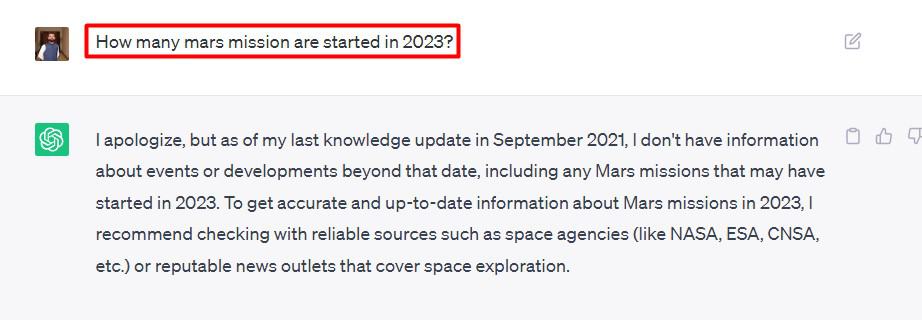
Writing is a Collaborative Process
Writing is not a solitary activity but rather a collaborative process. Writers often work with editors, publishers, and other professionals to bring their work to life.
While ChatGPT can generate responses, it can’t collaborate with others to refine and improve the writing. Writing is not just about generating words. It’s about working with others to create something truly special.
Can ChatGPT Help and Replace Authors?
ChatGPT is unlikely to replace authors. However, there are several key areas in which it can be a valuable tool in the book-writing process. Here are some specific areas where ChatGPT can help and potentially replace authors.
Idea Generation
ChatGPT helps generate ideas and storylines for writers who are struggling with writer’s block or who are looking for inspiration. By inputting a few keywords or phrases, ChatGPT can generate a list of potential ideas that writers can use as a starting point for their writing.
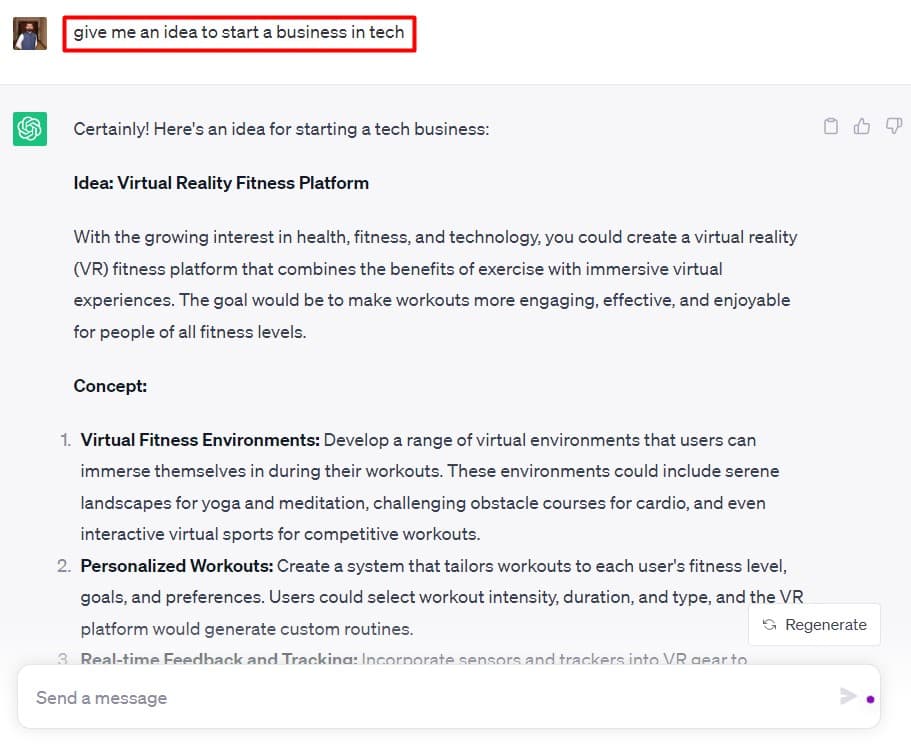
Streamlining the Writing Process
ChatGPT streamlines the writing process, making it faster and more efficient. For instance, it can generate outlines or summaries, suggest revisions, or provide feedback on grammar and syntax. This can save writers time and help them to focus on the more creative aspects of writing.
Apart from that, ChatGPT may produce summaries or outlines based on the older content. The updated content may have better visualization of the aspect. As an example, the following query was practiced on ChatGPT to generate a summary:
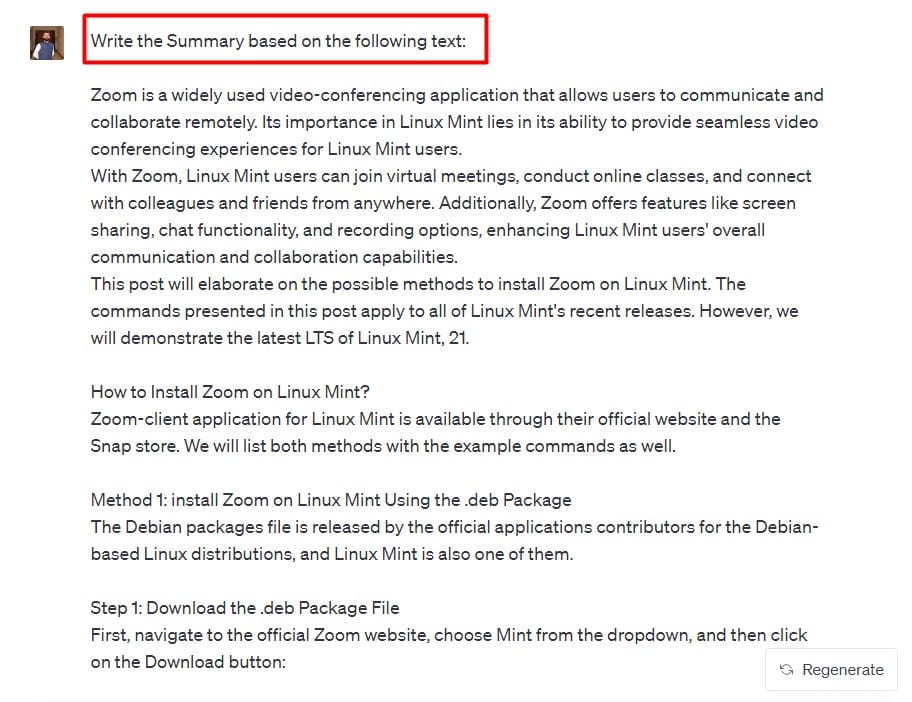
In return, the ChatGPT generated the following summary. However, it is to notice that before using, ensure to verify the outline is updated, or it has to be.
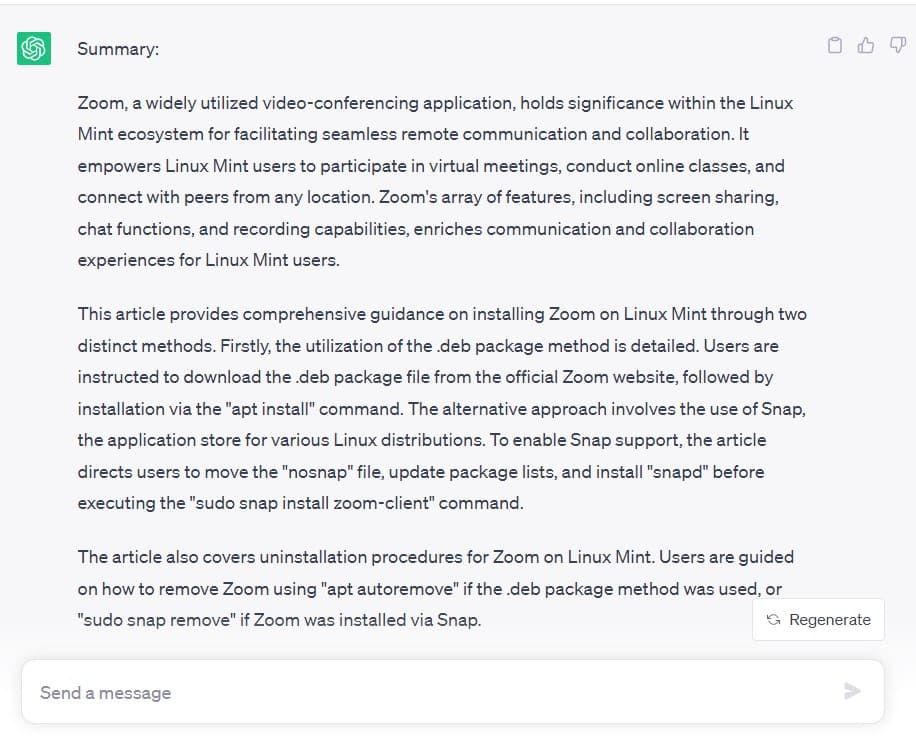
Translation
ChatGPT can translate written works into different languages. Authors who want to reach a global audience but don’t speak the language of their target market will find this use case especially helpful as shown in the following image:
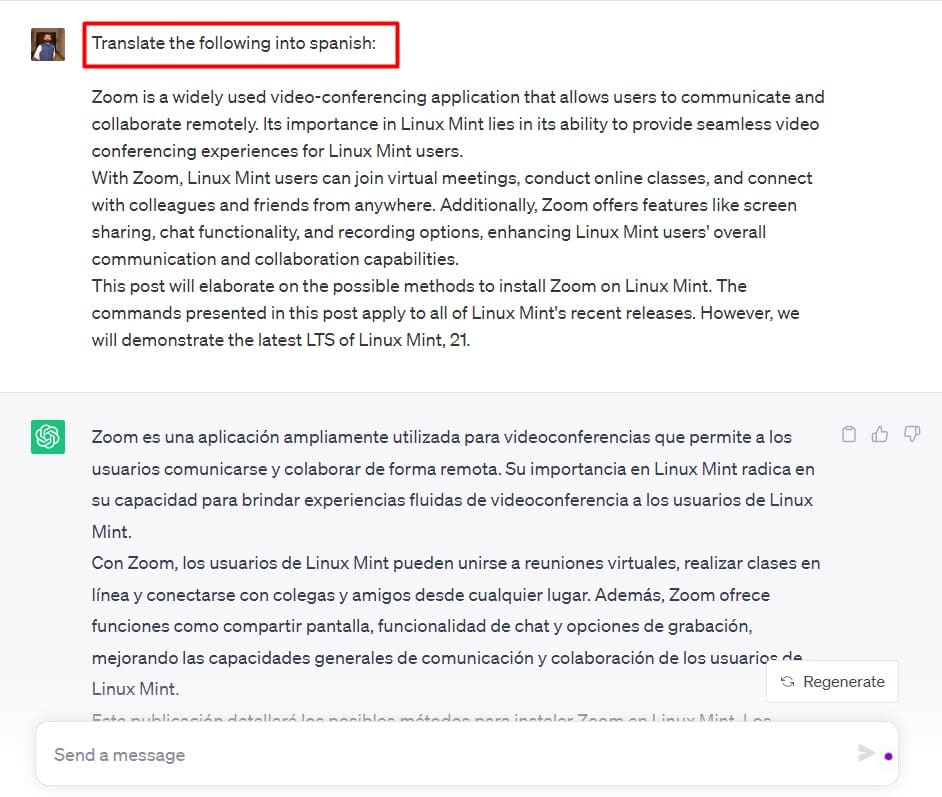
ChatGPT provides a rough translation that a human translator has to refine and polish which may double the effort. While human translators produce the results as per their requirements.
Text Generation
ChatGPT can potentially replace authors in generating simple text, such as product descriptions, news articles, or technical manuals. These types of writing often require a straightforward and formulaic approach that ChatGPT can easily replicate.
However, it’s important to note that while ChatGPT can be a helpful tool in these areas, it’s unlikely to replace human writers completely. An example of a description generated by the ChatGPT based on the specifications of the device:
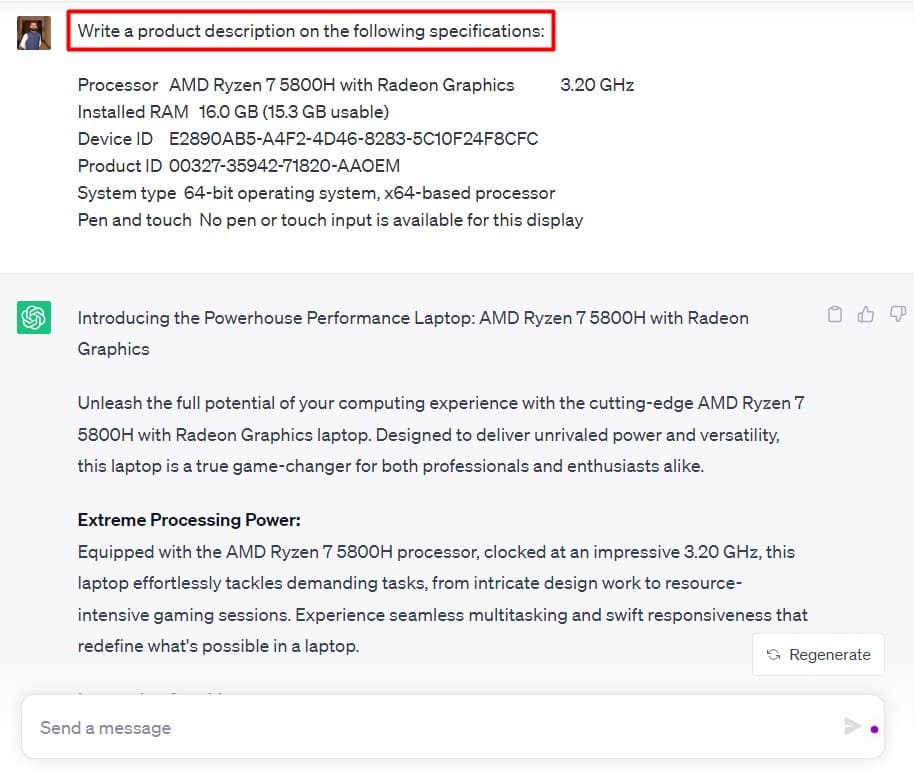
Will ChatGPT Struggle to Replace Authors?
While ChatGPT can be a valuable tool for writers, it will struggle to replace authors in certain areas that require human creativity, empathy, and originality. Here are some specific areas where ChatGPT will likely struggle to replace authors.
Emotional Connection
ChatGPT will struggle to replace authors in the area of emotional connection. ChatGPT can generate technically correct text. However, it lacks in producing an emotional touch in the writing.
Writing is often deeply emotional, and authors often use their writing to connect with readers personally and emotionally. For example, a memoirist may use their personal experiences to connect with readers who have gone through similar experiences, creating a sense of empathy and understanding.
Creative Writing
Creative writing requires a deep understanding of language, symbolism, and metaphor and a nuanced understanding of human emotions and experiences. For example, a novelist may use symbolism and metaphor to convey complex ideas and emotions, creating a rich and nuanced reading experience.
While ChatGPT can generate grammatically correct and structurally sound text, it will struggle to replicate the complexity and depth of human writing in this area.
Personalization
Personalization is another area where ChatGPT will struggle to replace authors. Writing is often deeply personal; authors draw on their experiences and emotions to create authentic stories. Thus, ChatGPT struggles to replicate the emotional depth and authenticity of human writing.
Poetic Language
Poetic language often relies on the use of metaphor, imagery, and symbolism to convey complex emotions and ideas. For instance, a poet may use metaphor to describe a feeling of sadness or loss, creating a powerful and evocative image that resonates with readers.
While ChatGPT can produce factual text, it struggles to replicate the poetic language often found in human writing.
Subjectivity
Writing often reflects the personal experiences and biases of the author, creating a unique and subjective perspective on the world. For example, a writer may have a unique perspective on a particular topic based on personal experiences and beliefs, creating a powerful and impactful message.
ChatGPT is trained to produce technically correct text but lacks the subjectivity and personal nature of human writing.
Complex Writing
ChatGPT struggles to replace authors in complex writing, such as literary fiction, poetry, or creative nonfiction. They require a deep understanding of language, symbolism, and metaphor and a nuanced understanding of human emotions and experiences.
While ChatGPT can generate grammatically correct and structurally sound text, it may struggle to replicate the complexity and depth of human writing in these areas.
How Does ChatGPT Affect Authors Negatively?
While ChatGPT can be a valuable tool for authors, it can also negatively affect the writing profession. Here are some specific ways in which ChatGPT can affect authors negatively.
Increased Competition
One negative effect of ChatGPT on authors is increased competition. As ChatGPT technology improves, it may become easier and cheaper for individuals and businesses to generate content using AI language models, reducing the demand for human writers.
This increased competition could make it more difficult for authors to find work and make a living from their writing. For instance, ChatGPT can generate text/articles on any topic. However, one Author can be an expert in one field at a time.
Devaluation of Writing
ChatGPT has potentially devaluated writing as a profession. ChatGPT leads to a wrong perception that writing is easy, reducing the perceived value of human skills. This could lead to lower pay for writers and less recognition for their work as it seems very easy to just write a prompt and then get the answer within seconds. The content shown below has been written by ChatGPT within a minute, while a human writer may take time to write this much content:
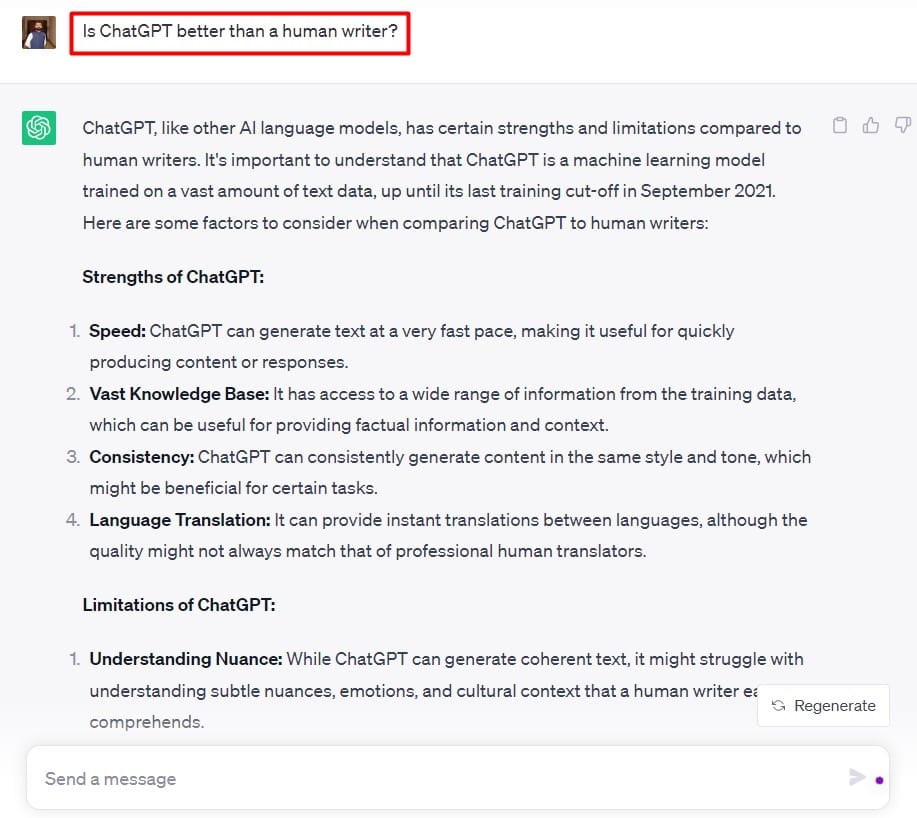
Plagiarism
AI language models can generate text quickly and easily, making it easier for individuals to copy and paste content without proper attribution. This could make it more difficult for authors to protect their intellectual property and profit from their work.
Like, if you copy/paste the content of a human writer and ask ChatGPT to produce unique content based on that. ChatGPT will do it quickly and happily, which questions the integrity of the human-written and the AI-generated content. An example of such a scenario is as follows, where the content has been given to ChatGPT and is asked to generate plagiarism-free content based on the given prompt:
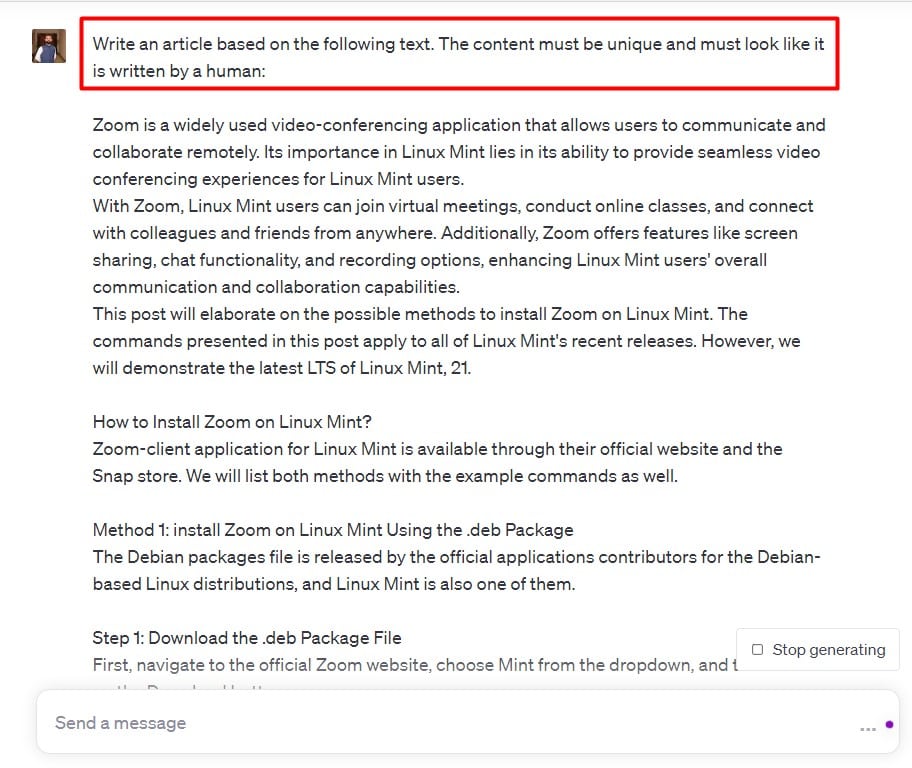
Based on the above prompt, the ChatGPT generated the content based on the text shown below:
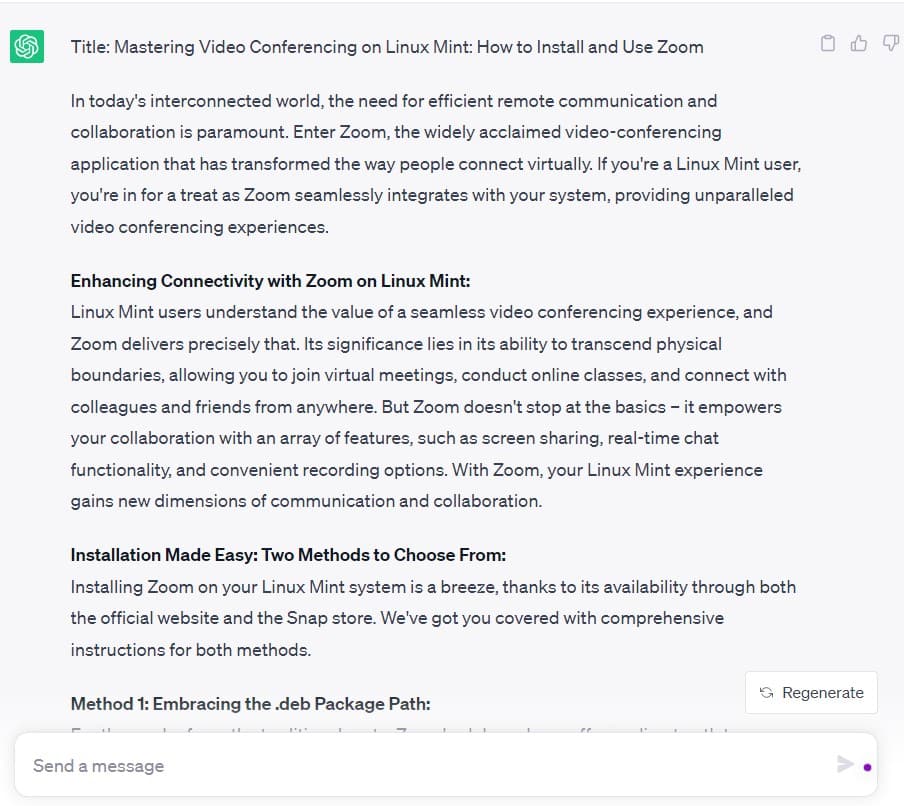
Loss of Voice and Perspective
ChatGPT can potentially reduce the diversity of voices and perspectives in the writing profession. As ChatGPT improves, it may become easier for individuals and businesses to generate content using pre-existing templates and structures, reducing the need for unique perspectives and original ideas.
Reduction in the Value of Experience
ChatGPT may reduce the value of experience in the writing profession. Individuals can use ChatGPT to generate content without prior experience or training in writing. This could reduce the perceived value of experience and expertise in the field, making the survival of experienced writers difficult.
FAQs
Can You Use ChatGPT to Write a Novel?
Yes, you can use ChatGPT to generate content for a novel. However, it is important to note that ChatGPT cannot replace the creative process of writing a novel. The final product will lack the depth and originality of a human-written novel.
How Does ChatGPT Affect Writers?
ChatGPT can affect writers in both positive and negative ways. It can help writers generate ideas, save time, and improve their writing skills. However, it can also increase competition, devalue the writing profession, and lead to a loss of voice and perspective in the field.
Is ChatGPT a Threat to Authors?
ChatGPT can be seen as a threat to authors in some ways, such as increased competition and potential loss of work.
However, it is important to remember that ChatGPT cannot replace the unique voice and creativity of human authors. There will always be a need for original, human-written content.
Can ChatGPT Replace Content Writers?
ChatGPT can generate content quickly and easily, but it cannot replace the expertise and originality of human content writers.
While it can be a valuable tool for generating ideas and improving writing skills, there will always be a need for human-written content that reflects unique perspectives and voices.